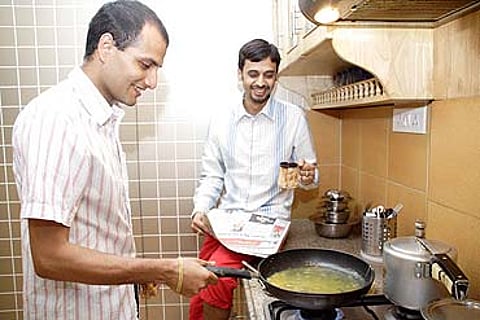The Circle Of Frisson
New city, fast life. The family is a faraway world. Friends are the backbone.
- With families scattered in different cities and countries, sibling and parental ties weaken and reliance on friends grows
- Families can be judgemental, inhibiting. Friends respect your independence, individualism more.
- Family relationships can be hierarchical, weighed down by baggage of old feuds and quarrels. Friendships offer more liberating, guilt-free relationships.
- 21st-century lifestyles of young urbanites have widened the communication gap with parents. Friends can be more, understanding, supportive.
- Long hours at work, commuting, leave less time for family. It's easier to socialise with friends at workplace.
***

Shirley: "There are no hierarchies, no judgements. We respect each other's space and independence."
Ishita Moitra, a 23-year-old script-writer, has found a surrogate family in Shirley Abraham, 24, associate executive producer with Fox TV. They met as students in the mass communications course at Delhi's Jamia Millia Islamia and hit it off from the very start, sharing a tiny barsaati with two other classmates. They bonded over everything, from bandhni salwars to bindi designs, from Kuch Kuch Hota Hai to Kieslowski, from boys to men. The girls have gone on to share a flat in Mumbai too. They celebrate each other's successes, cry together over disappointments and discuss their work as well as love lives. "We are like family to each other. We share our space, we share our lives," says Shirley.
A similar arrangement has taken shape for two young men in Hyderabad. Bhaskar Srivastava and Anutosh Chatterjee, both 29, went to the same school and college back home in Ranchi, stayed together in Hyderabad when they came to the city for an mba. They continue to live together and have even stuck together in their careers. Both work in Area Software Solutions, a company in which Anutosh is the director and Bhaskar the general manager. "We support and understand each other, we can depend on each other for everything," says Anutosh.

Marjorie:"I always turn to my friends first. It's a wonderful community pool to dip into."

Bhaskar: "With parents, when you return home late from a party, you face silent recrimination and there is the burden of guilt."
One natural reason for this loosening of the old structures is that families, even the immediate ones, are spreading out far and wide. Your sibling could be living in Boston while you work in Borivili. There may not be too many relatives to call on in a city where you recently moved to take up a new job. And even if your relatives are around, you rarely see them, because of lack of time, thanks to long working hours, other professional commitments and long distances to commute. In such circumstances, people tend to spend their limited leisure and socialising time with friends with similarly tight schedules and shared interests. "Aside from the nuclear family, I have no other relatives anywhere nearby. They are spread around the country and across the globe. A small inner circle of friends are pretty much my family, the people I lean on," says blog writer Peter Griffin.
"Our parents live about 1,800 kilometres away and we can't expect them to be around whenever we are in trouble. Many times, we don't even want to tell them about our problems," says Bhaskar. "You can't burden your parents with your day-to-day trivia if you are living away from them," says 33-year-old filmmaker Saurabh Narang, who stays in Mumbai with wife Priyanka, away from their home town, Delhi. The Narangs count three or four other couples, also living away from home, as their new family. Such is the bonding between them that, almost like a scene from a film, three of these couples are going to be parents soon. "It wasn't planned. But there is some design here, a sign of what we share," says Narang.
Ritu, a 41-year-old teacher, born and bred in Meerut, moved to Chennai with her husband some years ago. When her marriage began to collapse, she walked out of her house in the middle of one night and went over to her friend's place. "There was nobody else to turn to. She took me in without even asking her own family, she gave me the moral support that I so desperately needed," Ritu recalls. All this happened while no one in Ritu's own family even got a whiff of the trauma she was going through. "My friends held my hand, have been protective about my growing son, they get things that are needed for the house without my even asking them," she says.

Ritu: "They gave me the moral support that I so desperately needed. I can tell them things Ican't tell my relatives."
For Ritu, friends are her backbone, her lifeline. "I can tell them things I can't tell my relatives," Ritu says, echoing a common sentiment. "It's sometimes difficult to keep family threads together," adds Marjorie. "As your lives take divergent routes, very often you outgrow your closest cousins, even your siblings." Preetom Roy, 31, a Calcutta-based fitness trainer, spent his childhood in Europe and America and moved to India after his mother's divorce. Now he and his mother live in their ancestral house, on one floor, and he finds he has little in common with his relatives. "The larger family are relationships which I inherited, and they are merely acquaintances. But I can pick my friends, and they are spread across the globe," he says.
Moreover, family relationships are often weighed down by emotional baggage from thepast-- of hidden, festering hurts, petty powerplay, old quarrels and misunderstandings. Friendships, on the other hand, are relatively free of such burdens. In the fast-changing 21st century India, the generation gap is also a bit stark, often making communication with parents more difficult. Says Rakesh (name changed), a Delhi student, "It's difficult to sit down and talk to my parents; there's so much about me they don't understand. But I tell my friends about everything, they sort out things for me." Rakesh works part-time to fund his education, and once, when he couldn't pay his fees in time, it was his entire bunch of collegemates who spoke on his behalf to the principal. "My parents knew nothing about it."

Preetom:" The larger family are relationships I inherited, they are just acquaintances. But I can pick my friends."
Of course, families themselves are getting reinvented and redefined in different ways. A family can no longer be narrowly seen as one unit comprising a couple, their kids and perhaps the grandparents, living together. Urban Indian families now come in many morevarieties-- singletons, single parents, DINKS (double income no kids couples), single child couples. In these new schemes of relationships, the family is no longer all-enveloping, and inevitably friends acquire a bigger role, influencing and participating in every aspect of an individual'slife-- from being a surrogate family for a single or divorced person, to helping you find a new job.
However, there are people who instinctively feel that the growing role of friendships doesn't mark an eclipse of thefamily-- on the contrary, it can be seen as a reassertion of the institution. The very fact that friendships are becoming familial, are acquiring the colours of kinship, shows the primacy of the family, they argue. "Are friendships really replacing families?" wonders Narang, "or are we redefining our concepts of both friends and family, so that the lines dividing them get more and more blurred?"
Tags